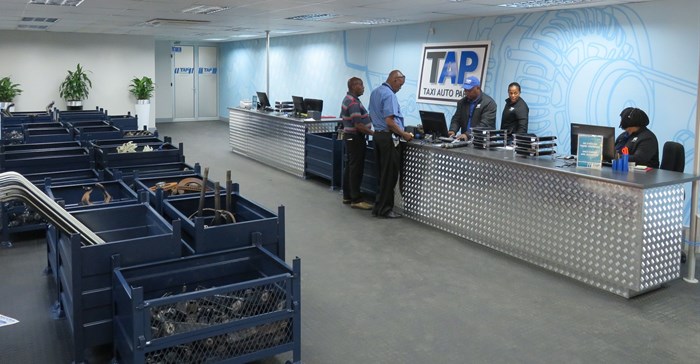
Top stories

Marketing & MediaWarner Bros. was “nice to have” but not at any price, says Netflix
Karabo Ledwaba 9 hours




Logistics & TransportMaersk reroutes sailings around Africa amid Red Sea constraints
Louise Rasmussen 1 hour

More news



















An organic extension of the SA Taxi value chain, which includes vehicle finance, specialised insurance designed for the unique requirements of the local taxi industry, a refurbishment and repair division, and a new and used vehicle sales network, Tap will add a cost-effective and convenient parts solution to the company's end-to-end offering.
Tap salvages quality parts from Toyota Quantum and Nissan Impendulo NV350 minibuses – the mainstays of the minibus taxi industry. “Through our extensive business network and our various divisions, we have access to a large pool of vehicles from which to draw parts,” explains SA Taxi communications executive, Maroba Maduma.
The company has leveraged this network and the economies of scale it creates to amass one of the largest and most diverse in-house taxi-only spare parts inventories in the country.
The parts, which include complete engines, engine parts, panels, and electrical components, among others, are removed, washed, inspected and, where appropriate, tested to guarantee safety and quality.
Permissible parts are then labelled, categorised and shelved in the Tap warehousing facility, where they are sold alongside new suitable replacement taxi parts for Toyota, Nissan, and Mercedes Benz vehicles.
“Taxi owners or operators are able to walk in, select a part and walk out again. This offers a more convenient means to source vital parts than that offered by conventional salvage operations,” explains Maduma.
“The improved affordability of parts also makes regular, proactive maintenance more accessible to taxi operators outside of our network, which we hope will benefit commuters by enhancing their comfort and safety,” says Maduma.
These parts will also be sourced by SA Taxi's refurbishment, repair and panel beating divisions to lower costs. “With immediate access to parts, we can get vehicles back on the road sooner, which limits revenue losses for operators,” he continues.
The integration of Tap into the SA Taxi network will also impact positively on other divisions. Savings on repairs can, for example, be passed on to taxi operators in the form of lower insurance premiums or reduced excesses.
“The cost-effective sourcing of parts from Tap can also improve pricing on refurbished second-hand vehicles sold through our Taximart division, which helps to lower the barriers to entry for new and emerging operators.”
Maduma believes that supporting the industry’s sustainability has become an example of a self-sustaining business model. “By transforming the sector through expanded access to formalised and professional operations, processes and facilities, we're benefiting all stakeholders, and the country’s economy as a whole, by creating a safer, more reliable industry,” he concludes.